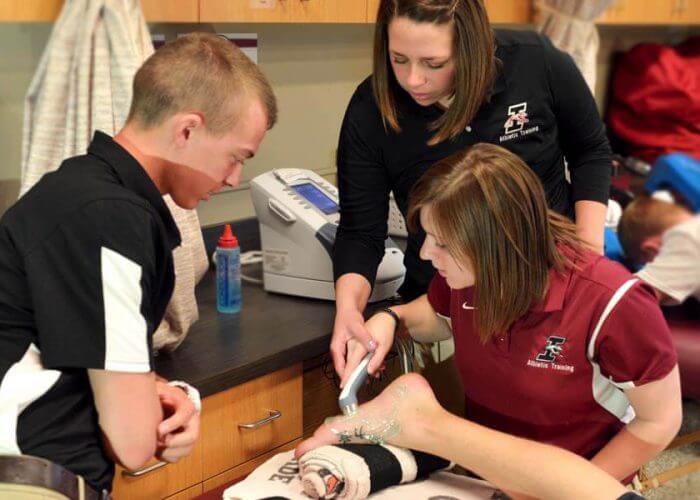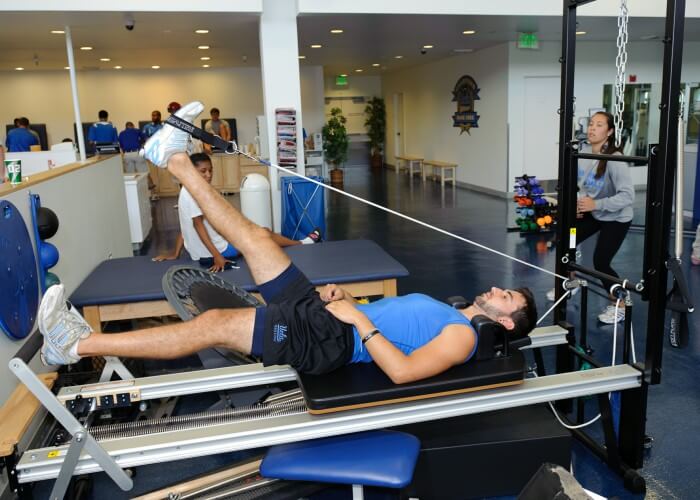5 Keys to a Quick Recovery from Injury

Photo Courtesy: Peter H. Bick
Left Sidebar
By J.P. Mortenson, Swimming World College Intern.
Getting injured is one of the most devastating things that can happen to a swimmer. It is immensely frustrating to have your own body give out on you. The recovery process is often a very lonely time, as you are forced to sit out while all of your teammates continue to train and compete without you.
However, getting injured is not the end of the world. If you follow your doctor’s orders and stay disciplined, you can overcome an injury and compete again. Here are five key ways to recover from injury from the perspective of a swimmer who overcame a lower-back stress fracture and is currently recovering from back surgery:
1. Get a correct and early diagnosis.

Photo Courtesy: University of Indianapolis
It is essential to understand the difference between being in pain and being injured. As swimmers, we are often told to “suck it up” and never to miss practice. However, if you are dealing with pain that is holding back your training and does not go away, it can be an indicator of a more serious issue.
If this is the case, then you should make an appointment with a doctor who can diagnose an injury. The earlier a doctor can diagnose your injury, the better. Trying to be tough and swim through an injury may worsen its severity and ultimately add more time to your recovery.
It is also important to understand why you were injured. Understanding the cause of your injury will both help you recover and make the changes needed to prevent re-injury.
2. Be patient.

Photo Courtesy: Arizona Republic-USA TODAY Sports
No matter how badly you want to return to the pool and resume your training routine, your body takes time to heal. Patience will be your most important asset during your recovery. Coming back from an injury is a daunting task, because you have to focus on both healing and getting back into shape. It’s only natural for negative thoughts to creep into your head. Do not let yourself go into a dark place. Yes, it hurts to be stuck on the couch while your teammates get to enjoy the sport you love. However, the more negativity you have and the more energy you spend feeling sorry for yourself, the more your mind will get the better of you.
Just remember that there is a light at the end of the tunnel. Most likely, your setback is only temporary. It may feel like an eternity until you return to swimming, but it really won’t be that long until you are back into it.
3. Look on the bright side.

Photo Courtesy: Stan Szeto-USA TODAY Sports
For swimmers, it is hard to be out of the pool for an extended period of time. It is a dramatic lifestyle change, as we are all used to having swimming dominate our schedules. However, if you approach this change with an optimistic mindset, you can improve. Use your newfound free time as an opportunity to develop your outside-of-swimming personality. Read a book. Go to the movies. Get ahead on schoolwork. Make some friends outside of the pool. Enjoy your free time while you can, because you won’t have it once you get back to swimming.
4. More is not always better.

Photo Courtesy: Don Liebig
It is important not to sacrifice your long-term health for short-term gains. If your injury has caused you to fall behind, it can be tempting to begin pushing again immediately to catch up. However, if you rush your way back into the pool and push too hard too fast, you risk setting yourself back a few days – or even worse, re-injuring yourself. Instead, it is much smarter to listen to your doctor’s recommendations and focus on your long-term health to making a full recovery.
5. Participate out of the water.

Photo Courtesy: Yale Athletics
Just because you are sidelined does not mean you cannot support your team. Ask your coach for things that you can do to help, even if they are only small tasks like getting times, helping with paperwork or cleaning up the pool deck.
You can also support your teammates by showing up at meets and cheering them on. Bring positivity and energy to the team. Show your teammates that although your body may be out temporarily, your spirit is alive and well. Your effort to be a part of the team will not go unnoticed, and staying connected to the team is a great way to remain positive.
All commentaries are the opinion of the author and do not necessarily reflect the views of Swimming World Magazine nor its staff.
Subscribe
Login
0 Comments
Oldest
Newest
Most Voted
Inline Feedbacks
View all comments



